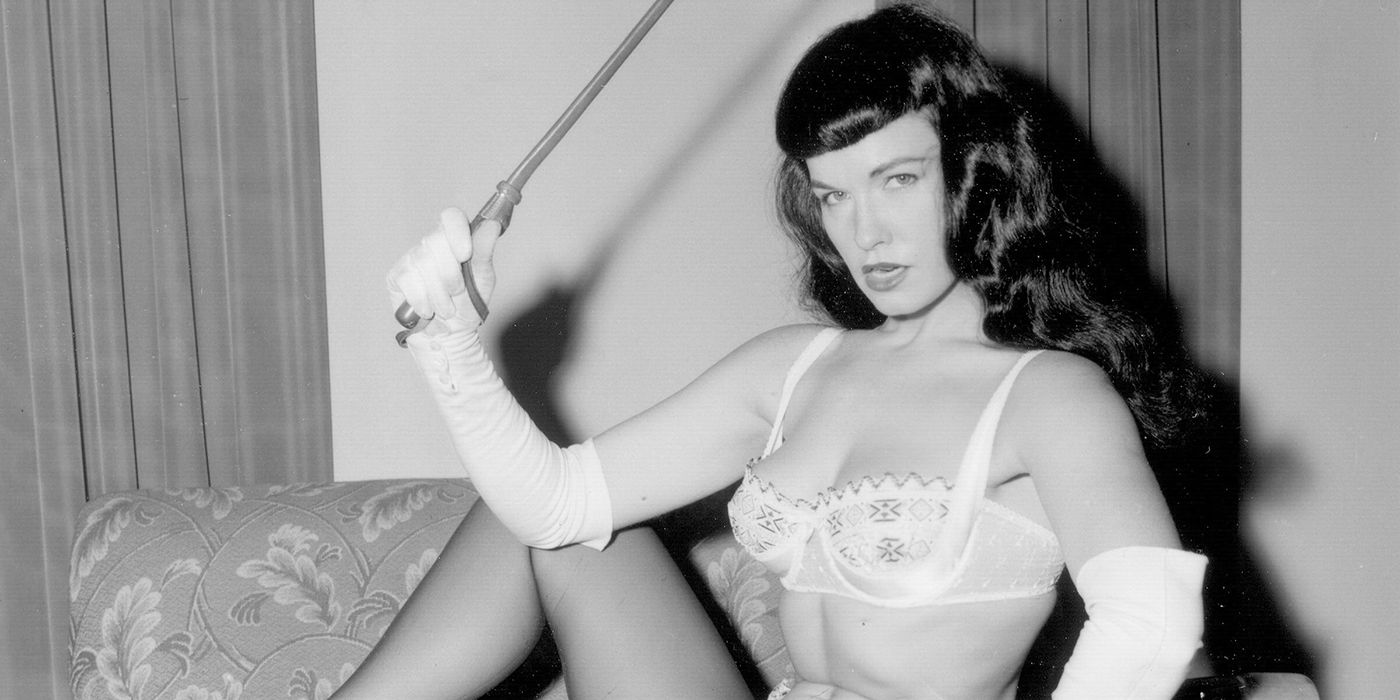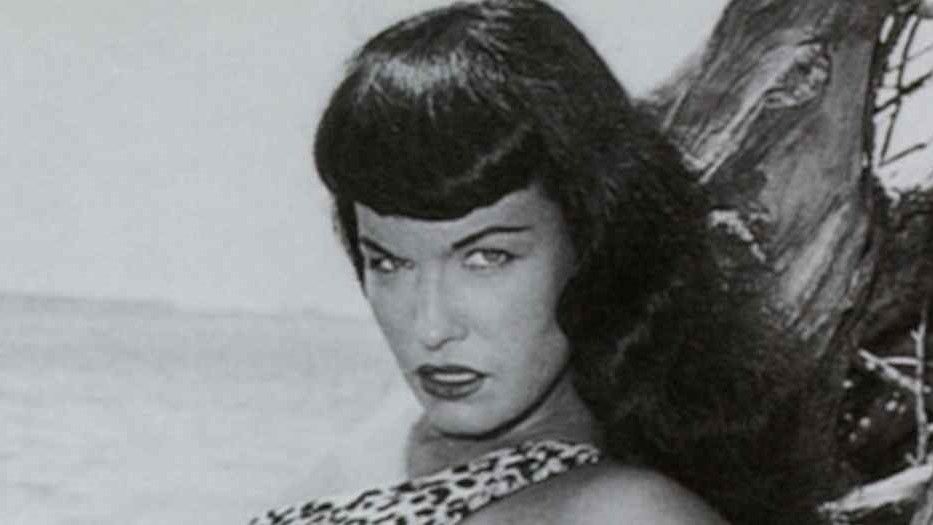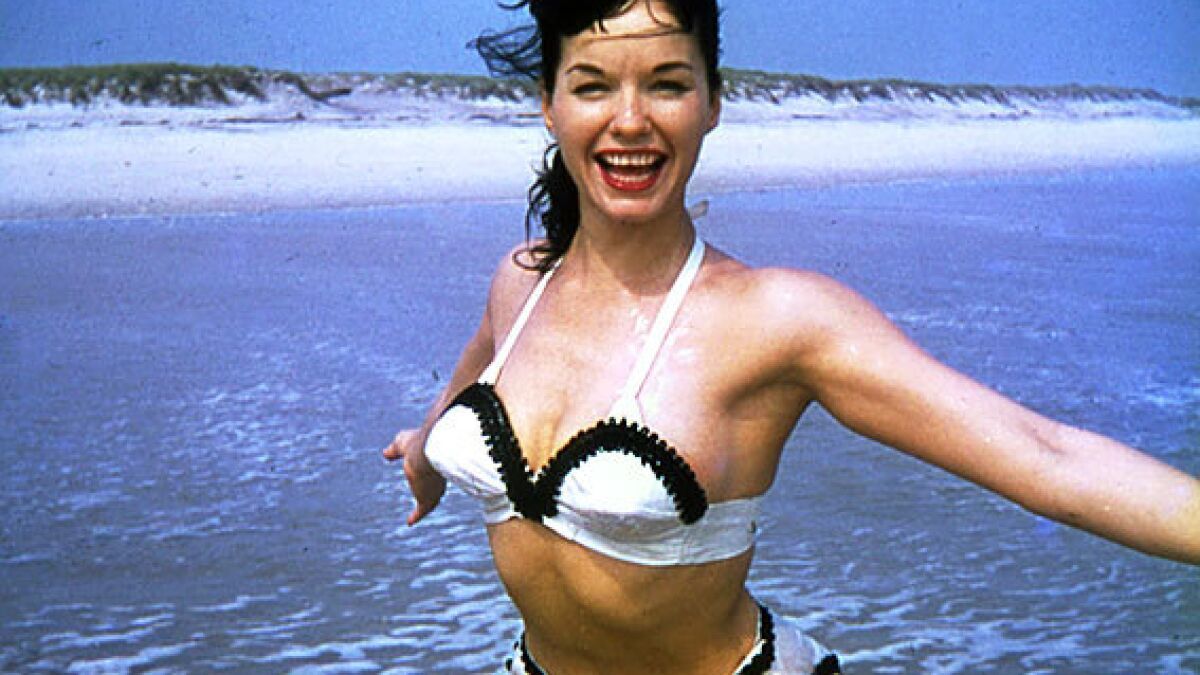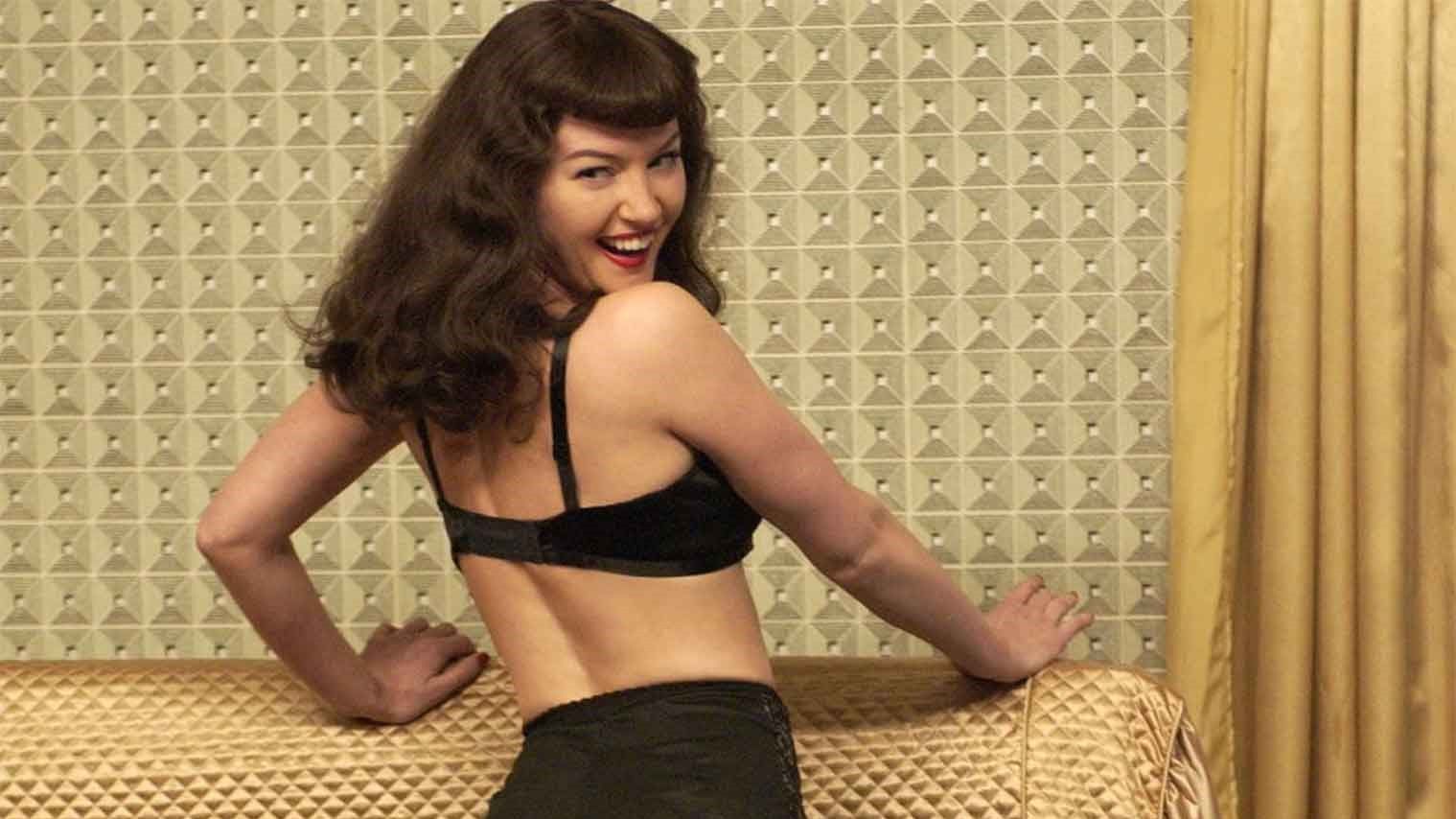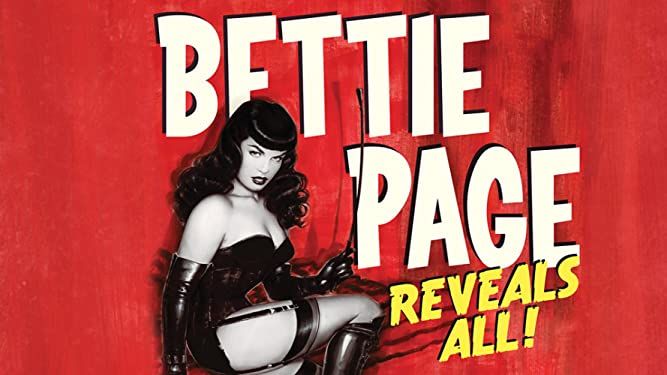You know the name. If you don’t, you know the face. If you don’t know the face, you know the style: that saucy, sizzling glare from under black bangs; the cheeky oohs and aahs. Summer bikini spreads or specialist S&M shoots, she was the Madonna Whore, the sinner saint, the good girl gone bad. She was Bettie Page, and she defined an era of glamour. Lady Gaga, Beyoncé and Dita von Teese — to name a very select few — have drawn inspiration from her look, her aura, her style of artistry; legions of fans around the world still look up to her as an icon of beauty and freedom. She was just one of a number of glamour models in her time, but something about her spirit, her wild but charming nature, stood out from the photos and had a profound effect on those who saw her. She would go on to cult stardom unlike anything she ever anticipated.
The 1950s were a very interesting time in American history. World War II was over, the economy was beginning to recover, and people were busy building lives as cheery and abundant as possible, after years of wartime deprivation. Rock ’n’ roll was emerging, teenagers were reinvented, life seemed more full of promise and happiness than ever before. The pin-up girl was one of the few symbols of freedom and joy that managed to outlive the war and hangover into the next generation. It turned out that even when bombs weren’t raining down, men still liked looking at beautiful women, and the carefree energy of nose art and cigarette card models continued to hold broad appeal.
Bettie Page's Rise to Prominence
It was in this climate that Bettie Page came to prominence. A Southern Belle of deeply Christian persuasion, she grew up in the midst of the Great Depression, and bounced between orphanages and the home of her impoverished and abusive parents. She had found great liberty and enjoyment in modeling for photographs since childhood, so when a policeman/part-time photographer discovered her on a beach as an adult, she began what would turn out to be one of the most prolific modeling careers of all time. She started out at camera clubs — small gatherings where amateur or semi-professional photographers would take pictures. Her popularity grew and she rose through the ranks, eventually shooting for such big names as Bunny Yeager and Playboy, but she would find her chief affiliation with a brother-sister team whose work would escalate her to new levels of infamy.
Irving Klaw and his sister Paula operated a pretty prolific mail-order service. Over the counter, they sold movie star pictures along the lines of Rita Hayworth in The Shawshank Redemption; under the counter however, they took requests from all sorts of people, and produced photos in their own studio. It was through this dynamic duo that Bettie got into the bondage scene, and to all involved, it was a strictly professional affair, although they knew they were dancing on a razor’s edge. Despite none of this work ever being explicitly sexual in nature, themes included spanking, wrestling, bondage and slave-training, and such practices were beyond taboo by 1950s standards. Everybody involved got a lot of hassle from law enforcement over it: the Klaw siblings were later ordered to destroy much of their work, with Paula having the good sense to smuggle some away, but poor Irving dying shortly after from the stress of it all.
As much as the ‘50s promised to be about fun and freedom, the era still held much injustice when it came to equality, gender roles and sexuality, and so Bettie’s rise as a glamour model was met with equal parts admiration and condemnation. She and other models like her had widespread fan bases, and many people enjoyed publications of their photographs, even if they wouldn’t admit it. The ever-present right wing would openly condemn such work, a sentiment which culminated in the Kefauver Committee, by whom Bettie was called to give evidence in the case of a young man who allegedly died trying to recreate one of her bondage shoots. With all of this background noise going on, the story of Bettie’s rise to stardom was much bigger than herself, and it is perhaps because of the societal norms and issues of the time that someone like Bettie would become the figurehead she did, and why her story is so worth telling.
An Acting Career that Never Was
While Bettie loved modeling and was incredibly good at it, she always saw herself as an actress. She did all the school plays, and in her early career did the rounds of the studio system, even landing a screen test at one. However, in an era when Joan Crawford was the beauty ideal, Bettie was a poor fit, just as her attempts to get into fashion modeling were squashed by her curvy frame. It seemed that Bettie needed to carve her own niche if she were to succeed in the arts, and by the time she teamed up with the Klaws, she had found a way to combine all her passions and talents into one spectacular show. She starred in a number of short films by the Klaw siblings, such as Striporama (1953) and Teasorama (1955), and approached every photo shoot as playing a character rather than just looking pretty for the camera. It may not have been the big screen heights she once dreamed of, but Bettie did manage to make a cinematic impact in her own lifetime, and even broke out into Broadway for a while.
In the late 1950s however, Bettie abruptly disappeared from the modeling scene, and for decades, people wondered what happened to the pinup icon. Some even speculated that she was dead. But over the decades, her influence on art and pop culture would continue to soar to heights she never anticipated. Painters and graphic artists used her as a muse, musicians sang about her, performers took inspiration from her look and presence, a fanzine was created for her. And unbeknownst to the world, Bettie had been living a troubled private life in the meantime, one marked by multiple marriages and divorces, religious fanaticism, mental illness, discrimination and hospitalization. One so far from her former self that she had no idea people still thought of her.
The '90s Bring Renewed Interest in Bettie Page
Bettie Page’s profile boomed in the 1990s, with huge merchandise sales and renewed media interest, resulting in a number of smaller scale documentaries and television specials that aimed to piece together her life story. But what these productions were often missing was any real input from Bettie herself. Even once she was found to be alive, she maintained an incredibly low profile, and never granted any on-camera interviews, wishing to be remembered as she once was. Clearly there was an important story to be told here, so when would fans get to really know Bettie through film?
As was inevitable, a sort of biopic about Bettie arrived in 2005, the brainchild of American Psycho director Mary Harron, titled The Notorious Bettie Page. It tells Bettie’s life in chapters from childhood to retirement, with the delightful Gretchen Mol in the title role, and while it only really skims the story and doesn’t do much to explore Bettie as a person, it is a stylish and evocative movie that is interesting and nice to look at. Shot mostly in black-and-white and boasting some really beautiful recreations of the era’s fashion, scenery and overall environment, it does well at transporting the audience to a time that seems cartoonishly innocent and simple by modern standards. But it is Bettie’s character that leaves something to be desired. For the title role, she gets fairly minimal development. The movie would have you believe that Bettie was a naive little cherub who didn’t drink or smoke or understand what she was doing in bondage gear because she was just such a gosh-darn nice Christian girl. However, as the defining work in Bettie’s cinematic legacy would later reveal, this was far from who she was, and Bettie herself would allegedly greet a screening of her 2005 biopic with the heckle, “Lies, lies, lies!”
The One Film That's True to the Pinup Girl's Life
Bettie Page Reveals All is easily the most comprehensive look at the life and influence of Bettie. A project several years in the making, it was crowdfunded by Bettie fans from all over the world, and directed by Mark Mori. Crucially, it is an incredibly rare perspective told by Bettie herself, and by people who knew her, worked with her, loved her. While Bettie’s spoken narrative provides the skeleton of the movie, it is fleshed out with interviews from friends, boyfriends, husbands and colleagues, as well as more contemporary figures, all of whom help to convey the scale of Bettie’s influence and establish something approaching the true version of events. Bettie herself is refreshingly open in her narration, divulging deeply personal perspectives and experiences that bring the audience to finally know her as a person and not just a pretty face or idealized character.
An intensely well-researched documentary, this is truly a joy to behold for any Bettie fan. It immortalizes her in the most honest and appreciative manner, ending on a particularly poignant note, where a convention full of fans gets to talk to Bettie over the phone and express how much she means to them. It also brings her amazing life to a bittersweet conclusion. With the help of Hugh Hefner and other associates, she finally got some proper management, actually earned money off her legendary status and saw some comfort and appreciation in her later years that she never expected. She died a much loved icon, someone whose presence lives on, and the movie captures all of this. Despite all the saddening details of Bettie’s life we learn in the runtime, it concludes in such a heartfelt way that one can’t help but feel uplifted by the whole experience.
After upwards of 60 years as one of the most famous faces in the world, it feels just that Bettie Page would finally have her story told properly, in her own words, and by the people who were there. Even for those with a casual interest in Bettie, or modeling, or the silver screen era, it is a great watch. But for those who know Bettie and always wanted something that really did her justice, this movie is a dream. Her disappearance allowed much speculation to suffocate the life she truly lived, but Bettie Page Reveals All brings it out into the light, the good and the bad, and embraces this complicated and remarkable woman for all that she was, and continues to be.

